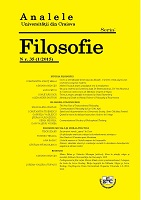L’ÉCHELLE MINEURE ET L’ÉCHELLE MAJEURE DE L’IMPOSSIBLE
THE MAJOR AND MINOR SCALE OF THE IMPOSSIBLE
Author(s): Ana BazacSubject(s): Social Philosophy, Ontology
Published by: Editura Universitaria Craiova
Keywords: the impossible; the possible; freedom Camus; Wittgenstein (Tractatus);
Summary/Abstract: The paper sketches the impossible as ontological concept, in fact as a negation of a ‚normal‛ ontological concept. This ‚normal‛ concept is the possible. The understanding of the impossible as an organizing principle of the world (or rather as ‚dis-organizer‛) has as criterion the ‚natural‛ necessity framing the possible things, but proposes to detach from this criterion. It’s just because man is the lens through which the world exists for him that the impossible depends on this lens. And it’s just because the possible is he consequence of the ‚obvious‛ necessity that it translates this necessity as a main modal figure of the explanation of the world. A phenomenological view is deployed here, by using two writers who are not expressly phenomenologist: Albert Camus and Ludwig Wittgenstein. The reason of this approach is to demonstrate that the concept of the absurd and the representation of the world in Tractatus might explain the common image about the impossible as well as the coherence of the concepts of freedom, responsibility and human power or possible. When events seem to them absurd, people say they would be ‛impossible‛, incredible, since intolerable. Here the term ‚impossible‛ is not opposed to the real, but to the logic, to the common sense. And, because the world as a totality of the logically deployed possible is necessary as everything logical is, that which surrounds us is ‚the field of the possible‛(Pindar): although the possible is always the novel, it is so as something probable, common/ usual, legitimate. The refusal of the absurd as‚ impossible‛ reveals the scale of the power of man to undertake this refusal. The two scales of the impossible are emphasised here, the minor scale being framed by the major one, the concept of freedom appearing just within this framing. In this way, the meaning of the impossible emerges – as ontological limit of my freedom – as well as the historical character of this limit.
Journal: ANALELE UNIVERSITĂȚII DIN CRAIOVA. SERIA FILOSOFIE
- Issue Year: 1/2015
- Issue No: 35
- Page Range: 167-188
- Page Count: 12
- Language: French

